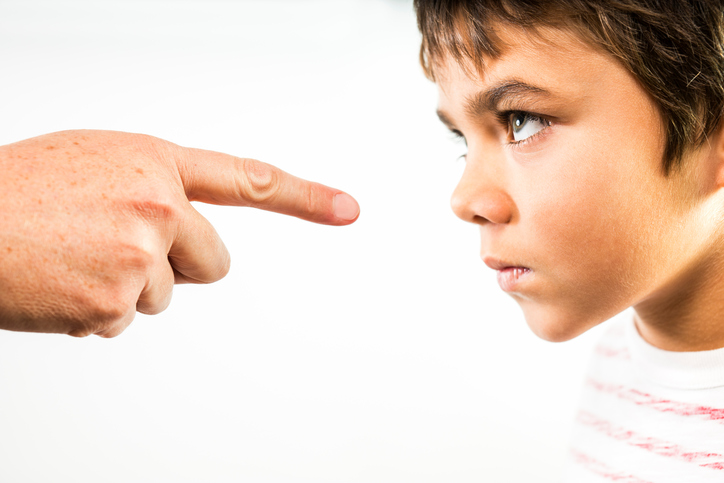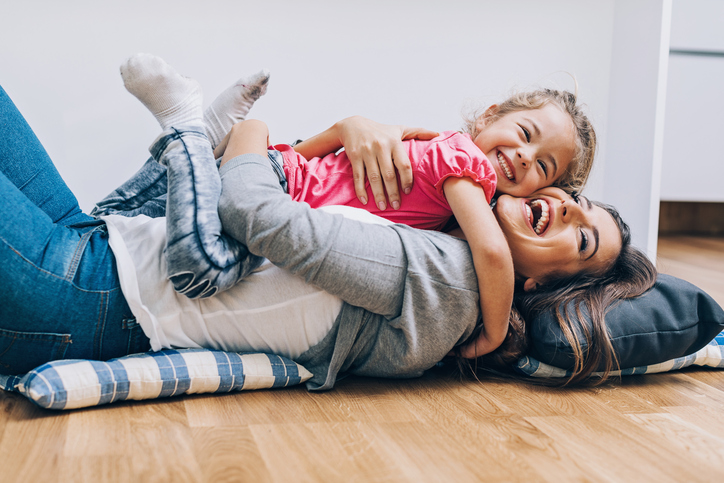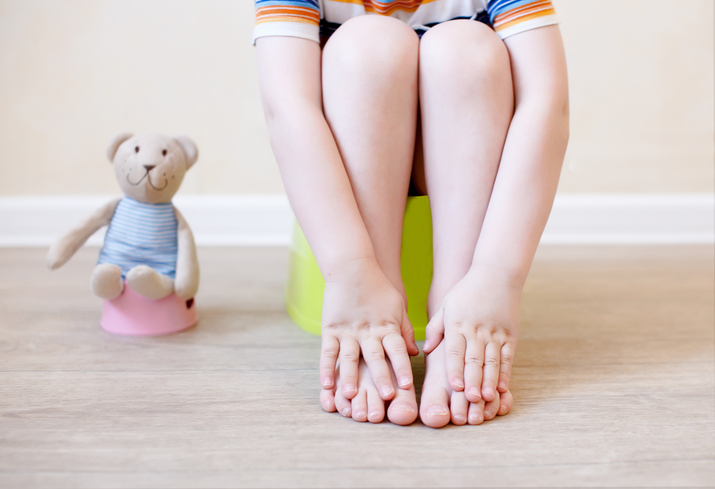Discipline Resources
Ways to Discipline

Parenting would be easy if only children cooperated and behaved appropriately! In the real world though, children need guidance and discipline to flourish and become their very best. Discipline is teaching a child how to behave appropriately. But teaching young children is not always a smooth and easy pathway. For most parents it’s more like a long winding road with many points of frustration along the way.
We have the best of intentions… until our child pushes our buttons, and then our perfect parenting ideas are quickly ignored and we find ourselves reacting in ways we never intended. This Parents Partner article describes many discipline techniques for transforming a misbehaving child into a cooperative child.
Discipline Extremes to Avoid
There are two parenting extremes you need to avoid:
- Some parents have unrealistically high expectations of their child, without giving their child emotional love and care. They command their children – “Do this, Do that.” Children parented this way feel unloved, which leads to the child feeling angry and rebellious (especially when they become teenagers and can express their rebellion).
- Some parents give their child a lot of love and attention, but don’t have many expectations for their child – the parent can’t say ‘No.” This child feels entitled which leads to them being spoiled and passive. Discipline that gets results avoids these two extreme parenting roles. Your child needs a balance of nurturing love, together with realistic expectations.
An Insight
The first step in resolving discipline problems is to ask yourself, “How effective have my current actions been in getting my child to behave the way I want him/her to?” In other words, is your discipline working? If you fi nd yourself frequently using high force techniques (yelling, getting angry, frequently putting your child in time-out), then it’s time to evaluate what is really happening with your discipline techniques. You need a new approach If your discipline is not working. Someone has wisely said, “Insanity is doing more of the same thing and expecting different results.” Most parents have their preferred method of discipline . . . And they generally keep using it regardless of how ineffective it is!
Because every child is unique, no single discipline method works for every child. Parents need a variety of discipline techniques because disciplining a child is a trial-and error process. If your discipline approach is not working, stop using it and try another technique.
Is Discipline Punishment?
The word discipline comes from the Greek word disciplina, meaning instruction or method. Discipline is not punishment.
The following table highlights the differences.
| PUNISHMENT | DISCIPLINE | |
|---|---|---|
| Parent’s attitude | Hurt the child | Correct the child |
| Parenting style | Using a lot of blame, shaming & humiliating | Uses nurturing love: listening, gentle but firm tone of voice, eye contact, hugging |
| Parent expectation | Child has to read parent’s mind | Parent sets limits with child before misbehaviour occurs |
| How parent speaks to child | “You are a bad girl/boy” | “What you have done is bad, even though you are still a good girl/boy” |
| How child feels | Pushed away: “I am bad | Drawn towards: “What I have done is bad, but I’m still okay as a person” |
| Child’s response | Children who feel bad, behave badly too | Child wants to please parent, so cooperates |
| The end result | Rebellion - and if not now, when they get older they will get even! | Cooperation |
Your Child’s Energy Bank Account
The real key to raising a cooperative child is to create a warm, nurturing parent-child relationship. Many parents think, “if only I had the right technique it would change this misbehaviour!” The reality is no amount of information, or knowledge of specifi c techniques will prove useful if there is a poor parent-child connection. The secret for making an impact in your child’s life is summarised in one word: CONNECTION. When your child feels emotionally connected to you, you have influence in their life. The stronger the connection, the greater the influence. To increase influence is to improve behaviour and reduce discipline problems. Our tutorial on building attachment is essential reading for parents with discipline challenges.
Children are hard to discipline when they feel bad, or disconnected from you. So the most important goal of parenting is to build a strong emotional attachment with your child. Through this emotional connection you give your child strong, positive energy. Within your child is an energy bank account. When the account is low your child feels unloved. Children who feel unloved (disconnected), usually behave in unloving ways too – misbehave. But when children have a high energy account, they want to please their parents, and usually cooperate.
It’s easy to put deposits in your child’s energy bank account. Here’s some powerful ways to do it:
| Emotional Deposits | Age | How to Do it | Keep in Mind |
|---|---|---|---|
| Quality time | All ages | Spend frequent, uninterrupted one on-one time with your child | Shows you care for your child. Provides opportunities for your child to talk |
| Be aware of positive behaviour | All ages | Acknowledge your child’s good behaviour | Affirm your child when they are playing cooperatively, sharing, reading, obeying, etc. |
| Physical affection | All ages | Hugs, touch, cuddles | Physical affection creates strong feelings of security, value and belonging within your child |
| Talking with your child | All ages | Have brief conversations about an activity, or interest of your child | Excellent for building your child’s conversational and social skills |
| Be an incidental teacher | 1-5 years | Creating teaching moments when your child is interacting with you | Helps your child understand how things work |
| Setting a good parental example | 3-5 years | Provides your child with a model of desirable behaviour | Good for teaching your child skills: using bathroom, washing hands, tying shoelaces, solving problems |
| Encouraging independence | 3-5 years | Using verbal and non-verbal communication to teach your child self-care skills | Teaching your child to brush their teeth, make the bed, tidy up, etc. |
| Providing meaningful activities for your child | All ages | Provide your child with age appropriate activities Felts, paper, paints, books, games, toys, balls are all great activities to get your child’s energy focused. | TV is no substitute for meaningful activities |
| Encouraging/Empathy | All ages | Using your tone of voice and words to express how valuable your child is to you | Children do best when they are encouraged. Remember, they are learners and will make mistakes |
Discipline Techniques
Don’t be tempted to use the following techniques as a quick fix for your child’s behavioural problems. While the techniques can modify your child’s behaviour, the goal of good parenting is to raise a cooperative child who ultimately learns to discipline himself or herself. Any technique used in a coercive way ultimately defeats the purpose of effective parenting. The real key for successfully using these techniques is to work harder on the parent-child relationship, than you do on using the techniques.
Here are some techniques for disciplining your child.
| Technique | Age | How to Do it | Keep in Mond |
|---|---|---|---|
| Redirect your child’s behaviour | 1-4 years | Instead of saying “No,” or “Stop,” distract your child with a toy, or a new activity. | This technique works really well for children under 2 years. |
| Establish limits | 1-5 years | Establish behavioural expectations with your child. | Have few rules; Rules should be fair; Rules should be easy to follow; Rules should be enforceable. |
| Give clear, calm instruction | 1-5 years | Asking your child to engage in specific behaviour, or carry out a task or activity. | Get physically close and gain your child’s attention. State what you would like your child to do. |
| Ignore the behaviour | All ages | Ignore behaviour you do not like, but can tolerate, like whining or crying. | Show no response at all - no eye contact, no touching, no talking, no smiling. |
| Positive reinforcement | 1-5 years | Praising your child every time he/she doesn’t do the problem behaviour. | Good technique to use for defiant children. Always link the praise to a specific action. |
| Provide a physical outlet | 3-5 years | Children need regular physical play to energise their life. | Children are easier to manage when they are physically recharged. Misbehaviour is energy misdirected. |
| Provide options | 2-5 years | Give your child a choice: “You can wear the pullover or jacket.” | Gives your child a sense of control, and encourages his/her decision making. |
| Encourage your child to share feelings | 3-5 years | Ask your child to use words to describe how they feel when they are expressing sadness, anger, or fear. | Unexpressed feelings come out in uglier ways. Coach your child to label his/her emotions. |
| Logical consequences | 4-5 years | Set a consequence for your child that is age appropriate. | Involves either removing the child from the activity, or the activity from the child. |
| Quiet time | 1-5 years | Placing your child on a chair in the same room as you for a specified time. | Remove your child from the activity, but not from your presence. |
| Time out | 1-5 years | Remove your child to an area away from other family members. | Time out is more effective if you have had time-in. Emotionally connected children respond appropriately to timeout. |
Use Your Non-Verbals
Discipline is all about communicating effectively. Research has discovered that 93% of our communication is non-verbal. Word’s only account for 7% of a communication message. So don’t focus on what words to use! Use your tone of voice and body language to convey your message. Here are a couple of ways to do this effectively:
- When you give a command, or want to put a deposit in your child’s energy bank account, have your child within arms reach of you. Physical closeness is a powerful non-verbal.
- Listen to your child with your eyes. Eye contact builds connection.
- Communication is more effective when it is eye level to eye level. Lift your child up, or get down on the floor and watch how powerfully you connect with your child.
Check out of interventions and tutorials for specific child challenges and LIKE our Facebook page to be kept up-to-date on recent articles for parents.



